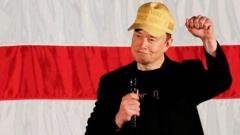In a high-profile initiative, tech mogul Elon Musk has announced a plan to give away $1 million each day to a registered voter in Pennsylvania until the US presidential election on November 5. This decision is part of Musk's campaign group, AmericaPAC, which aims to bolster Republican candidate Donald Trump’s campaign in this crucial swing state. The winner of this lottery-style initiative will be selected randomly from participants who sign a pro-constitution petition, purportedly designed to promote free speech and gun rights.
The first winner of the giveaway was revealed at a recent town hall event, enhancing the visibility of Musk's undertaking. This strategic financial incentive appears to stimulate engagement among potential Trump voters as the election approaches.
Musk's giveaway has raised serious concerns regarding its legality. Renowned election law expert Rick Hasen articulated his view in an online post, categorizing the initiative as “clearly illegal.” According to federal regulations, paying or offering payment for voter registration or voting can attract significant penalties, including fines and prison time. Hasen argues that by targeting voters in swing states, Musk’s approach may contravene these laws.
Participants signing up for the petition are required to provide personal contact information, potentially allowing AmericaPAC to communicate about their voting plans. Such practices are common among campaigns and political action committees, which utilize data gathered from signatures and surveys to refine voter targeting and fundraising strategies.
Previously, Musk had attempted a different strategy, offering $47 to individuals who could enroll registered swing-state voters to sign the petition. While this tactic sparked criticism, it may have slipped through legal loopholes since it did not involve direct compensation for voting itself. Historically, US law prohibits any financial incentives that aim to sway voters, an issue that even led to the ice cream company Ben & Jerry’s providing free ice cream on election day in 2008.
Concerns about the legality of Musk's recent efforts have been echoed by Pennsylvania’s Democratic Governor Josh Shapiro, who expressed alarm over the implications of this strategy. He suggested that law enforcement scrutiny may be warranted.
Musk, a prominent supporter of Trump in recent years, established AmericaPAC in July with the intent of financially backing Trump’s campaign. To date, he has contributed $75 million to the endeavor, making AmericaPAC a vital force in Trump’s election strategy. The group emphasizes values such as secure borders, social safety, and individual rights.
Musk aims to garner one to two million signatures from voters in battleground states to promote constitutional rights. He asserts this movement sends a vital message to policymakers.
As the richest individual globally, with a net worth estimated at $248 billion, Musk’s influence could significantly impact the dynamics of the forthcoming election, which stands to hinge on votes from key battleground states, including Pennsylvania.





















